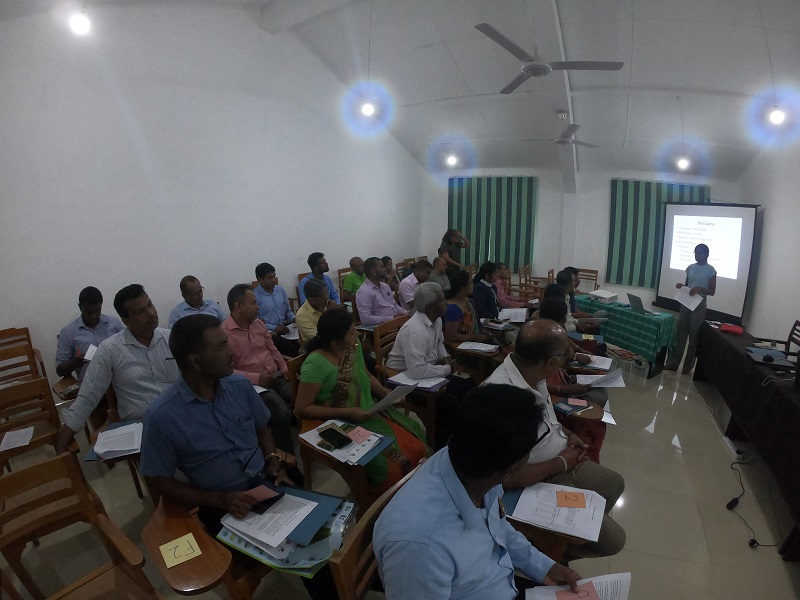Training of Trainers on Ecosystem Services Benefits and Innovative Sustainable Land Management Financing
A Training of Trainers (TOT) workshop on ecosystem services benefits and innovative sustainable land management financing was conducted on 21st and 22nd January 2020, at the Tea Small Holdings Development Authority, Hantana, Kandy.

Training of Trainers Workshop at TSHDA Hantana, Kandy
Photo: Sampath de A Goonatilake/IUCNSL
Senior Government Officials such as the Provincial Director of Agriculture, Planning Directors, Deputy Directors, Assistant Directors and Development Officers of various departments from the districts of Kandy, Badulla and Nuwara Eliya participated in the workshop with the aim of enhancing their knowledge. The event was facilitated by IUCN Sri Lanka as part of component three of the GEF funded project on “Rehabilitation of Degraded Agricultural Lands (RDAL) in Kandy, Badulla and Nuwara Eliya Districts in the Central Highlands” which is implemented by Food and Agriculture Organization of the United Nations with the Ministry of Environment and Wildlife Resources in consultation with Natural Resources Management Centre of the Department of Agriculture.
The workshop focused on various aspects such as how to identify and value ecosystem services in agricultural lands, provide necessary training to assess the shortcomings related to the current land management practices, develop suitable innovative financing mechanisms to promote sustainable land management practices to encourage/ incentivize farmers to conduct sustainable land management practices on their lands and how different practices affect the availability of ecosystem services. All these areas were discussed with a field component/exposure and a land use game in order to demonstrate the practical aspect of two main subject areas (SLM relate d ES and IFMs). The goal of the workshop was that trainees will then be able to pass on the knowledge to regional offices, extension staff and other stakeholders, and incorporate the information in projects and/or policy and decision-making. Accordingly, a few key participants from each district were identified to facilitate the district level awareness workshops conducted thereafter. A Tri-lingual Training of Trainers Manual in this aspect was also introduced with the trainers upon their training. https://drive.google.com/drive/folders/1unLH4MvcftPIjOnYGLqOOamxEK2jYhDu
IUCN Sri Lanka contributed to the project efforts by promoting the use of a scientific approach based on environmental economic principles to assess the ecosystem services resulting from the use of Sustainable Land Management (SLM) practices in agricultural landscapes; and conceptualizing the role which Innovative Finance Mechanisms can play to realize the objectives of the RDAL project. After the successful completion of a rapid assessment of ecosystem services observed in the lands of the beneficiary farmers and consultations with potential private sector stakeholders, the methodology used by IUCN Sri Lanka was validated by a panel of academic experts and national stakeholders.
